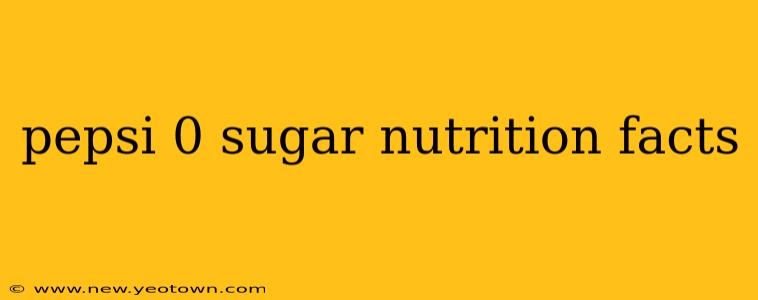For those seeking a refreshing, zero-sugar cola, Pepsi Zero Sugar has become a popular choice. But what exactly is in this sugar-free alternative, and how does its nutritional profile stack up? Let's delve into the details, addressing some frequently asked questions along the way. This isn't just a simple nutritional breakdown; we'll explore the ingredients, potential health implications, and compare it to other similar beverages.
Pepsi Zero Sugar Nutrition Facts: The Basics
A standard 12-ounce can of Pepsi Zero Sugar typically contains:
- Calories: 0
- Total Fat: 0g
- Saturated Fat: 0g
- Cholesterol: 0mg
- Sodium: 35mg
- Total Carbohydrate: 0g
- Sugars: 0g
- Protein: 0g
It’s important to note that these values can vary slightly depending on manufacturing processes and the specific can or bottle. Always check the label on your individual purchase for the most accurate information.
What are the ingredients in Pepsi Zero Sugar?
Pepsi Zero Sugar contains a blend of ingredients designed to mimic the taste of regular Pepsi without the sugar. The exact formulation can change subtly over time, but typically includes:
- Carbonated Water: This forms the base of the drink, providing the fizz.
- Caramel Color: This provides the characteristic dark brown color of cola.
- Phosphoric Acid: This adds tartness and acts as a preservative.
- Caffeine: Provides a stimulating effect.
- Artificial Sweeteners: This is where the sugar-free aspect comes in. Common artificial sweeteners used in Pepsi Zero Sugar include aspartame, acesulfame potassium, and sucralose. The exact blend may vary by region.
- Natural Flavors: These are added to enhance the taste and create the familiar Pepsi flavor profile.
- Citric Acid: Contributes to the overall flavor balance.
- Potassium Benzoate and Potassium Sorbate: These are preservatives that help extend shelf life.
Does Pepsi Zero Sugar have any carbs?
The answer is technically yes, but the amount is so minimal that it's often listed as 0g on the nutrition label. This negligible amount comes from the small quantities of other ingredients. For practical purposes, you can consider Pepsi Zero Sugar carbohydrate-free.
Is Pepsi Zero Sugar bad for you?
Whether Pepsi Zero Sugar is "bad" for you is a complex question. While it's calorie-free and sugar-free, making it a better choice than regular soda for those watching their weight and sugar intake, the long-term effects of artificial sweeteners are still under research. Some studies have raised concerns about potential links between artificial sweeteners and health issues, although more research is needed to confirm these connections definitively. Moderation is always key. Pepsi Zero Sugar shouldn't be considered a health drink; it’s a beverage to be enjoyed in moderation as part of a balanced diet.
How does Pepsi Zero Sugar compare to Diet Pepsi?
Diet Pepsi and Pepsi Zero Sugar are very similar, both being sugar-free cola drinks. The primary difference lies in the type and blend of artificial sweeteners used. Diet Pepsi may contain a different combination of sweeteners than Pepsi Zero Sugar, leading to potentially minor differences in taste and aftertaste. Both aim for a similar outcome—a low-calorie, sugar-free alternative to regular Pepsi.
What are the potential side effects of Pepsi Zero Sugar?
Some individuals report experiencing side effects from artificial sweeteners, such as headaches, digestive upset, or altered gut microbiome function. These effects, however, are not universally experienced and vary from person to person. If you experience any adverse reactions after consuming Pepsi Zero Sugar, it's best to discontinue use and consult a healthcare professional.
This in-depth look at Pepsi Zero Sugar's nutrition facts and ingredients provides a comprehensive understanding of this popular beverage. Remember that this information should not be considered medical advice. Always consult with a healthcare professional or registered dietitian for personalized dietary guidance.

